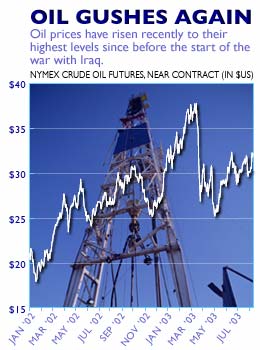NEW YORK (CNN/Money) - Oil prices have surged lately to their highest levels since before the start of the war with Iraq, but most economists aren't yet worried about them drowning a nascent economic recovery in the United States.
If that recovery's not self-sustaining, however, higher prices could become more of a problem.

Crude oil futures on the New York Mercantile Exchange were trading at more than $32 a barrel Monday morning, down a bit from last week but still near their highest level since mid-March, when prices were driven by fears about how war in Iraq, the world's No. 8 crude producer, would disrupt global crude supply.
When the widely feared sabotage of Iraqi production facilities and pipelines didn't come to pass immediately, oil prices dropped. Many traders figured the United States would get Iraq's oil flowing soon, boosting the world's crude supply and keeping prices low.
Since then, however, getting Iraqi oil production back on line has proven to be a dicier task than many anticipated, due to power failures, looting of production equipment, unrest in some parts of the country, and the lingering threat of terror attacks and sabotage.
Combined with supply troubles in other major producers such as Nigeria and Venezuela, world crude supplies have remained tight in the wake of the Iraq war, and the price of oil has bounced around between $29 and $32 a barrel since late May.
Many economists had hoped a dramatic, post-war drop in oil prices would be just what the doctor ordered for a U.S. economy still struggling to sustain growth after the 2001 recession; since so many U.S. consumers and companies rely on gasoline for their daily activities, higher prices tend to put the brakes on economic activity, while lower prices are generally helpful.
| Related stories
|

|
|
|
|
"At this point I would have expected more of a boost from lower oil prices," said Goldman Sachs economist Jan Hatzius. "If you'd told me before the war that the military action would go as smoothly as it did and that Saddam Hussein didn't blow up his oil facilities, I would have thought oil prices would be lower."
Still, Hatzius and many other economists doubt that the recent price of oil, even if it remains at this level for several weeks, will stop the economy in its tracks.
"Oil is the dog that didn't bark," Hatzius said. "It's neutral because it's not far away from the average of where it's been over the past year."
High prices could be positive sign
Though higher oil prices certainly aren't helping the economy, they could be interpreted as an early sign of economic spring -- just as higher interest rates, which tend to slow down economic growth, are tolerable as long as the rest of the economy is surging, too.
"If prices are rising in response to a pickup in global demand, that's a good sign for the economy," said Gerald Cohen, senior economist at Merrill Lynch. "Though it does impart a drag on the economy, you don't feel it as much."
On the other hand, if the economy's rebound is not self-sustaining -- if greater consumer and corporate demand doesn't translate into higher job growth, in other words -- then oil prices, along with higher natural gas prices and rising interest rates, could nip the recovery in the bud.
"If prices remain where they are, and the rest of the economy performs well, that won't be the end of the world," said Sung Won Sohn, chief economist at Wells Fargo & Co.
"But if things start to go wrong -- if business spending doesn't pick up, or state and local governments lay off more people than anticipated, or auto sales fall off, or interest rates go much higher -- then a combination of these factors would really affect the economy going forward," Sohn said.

|

